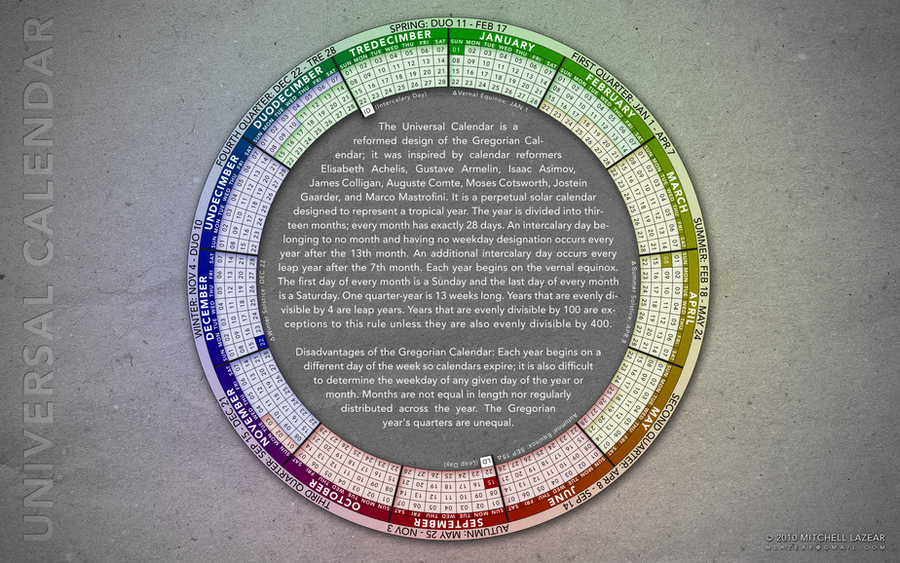The British Republican Calendar
(taking place in the same universe as the France map I've been making in the last few weeks (latest update here); some of this information is vague and can easily be retconned if/when I actually make a map of Britain from the same universe)
In the years after the Stuart monarchy was driven out of Britain by the Parliamentarians, England (and New England, which had largely supported them) slowly became more autocratic, culminating with Oliver Cromwell declared as Lord Protector*. By 1780, the Cromwells had been ruling as quasi-absolute monarchs in an autocratic Protectorate that still clung to its strict Puritan orthodoxy and general hostility to most nations in Europe (including France, in spite of its religious toleration to both Protestants and Catholics), especially the Catholic nations of Spain and the Papal States. In 1789, a revolt broke out in the Tower of London, replacing the Protectorate with a republican government spanning the British Isles. Unfortunately, said republic fell to an analogue to the Reign of Terror until 1798, which lead to an Irish revolt that lead to the creation of the French-backed Kingdom of Ireland by 1801. Ultimately though, the situation had stabilized with the creation of the Directory, and Britain to this day is still proud of its republican heritage and its status as one of the preeminent republics in Europe (to say nothing of the larger Federation across the Pas de Calais).
One of the changes that still endures from the First Republic¹ is the creation of a new calendar in 1792 to symbolize the break with the royalist/Protectorate past and the Old Julian calendar. Divided into 13 months of 28 days (plus a extra 1-2 days which don't belong to any month and have no weekday designation), it was designed to keep the seven-day week (with the first day at Sunday) whilst removing any trace of "Papist" influence (hence why the months are named after the seasons). The calendar spread to New England, as well as to Britain's colonial empire, and today it is still used in those areas alongside the Gregorian calendar (even in Britain, while officially using this calendar, also uses the Gregorian calendar in unofficial contexts).
*One of the PoDs being that Cromwell lives longer(-ish)
¹the other is the creation of the departments system, which I may elaborate if/when I make a map of Britain of this universe.
The first day of the year starts at 25 March, the traditional New Year in England. In addition, the calendar is set at 1649 (the year when Charles I was executed, which the republic claimed was the first stirrings of freedom and republicanism), with eras divided between AR (
anno Revolūtiōnis; sometimes "after the Revolution") and BR ("before the Revolution")
The 13 months (named after the prevailing weather in and around London) are as follows:
Verneus - 25 March to 21 April (from Lat.
vernus "spring/vernal")
Germaneus - 22 April to 19 May (from Lat.
germen "germination")
Floreus - 20 May to 16 June (from Lat.
flos "flower")
Medeore - 17 June to 14 July (from ME
mede "meadow")
Thermidore - 15 July to 11 August (from Gr.
thermon "summer heat")
Fructidore - 12 August to 8 September (from Lat.
fructus "fruit")
Automnal - 9 September to 6 October (from Lat.
autumnus "autumn/fall")
Harvestal - 7 October to 3 November (from English
harvest)
Brownal - 4 November to 1 December (from English
brown; ie the browning of leaves)
Brumelle - 2 December to 29 December (from Lat.
bruma "winter solstice")
Snovelle - 30 December to 26 January (from English
snow)
Pluvielle - 27 January to 23 February (from Lat.
pluvius "rainy")
Windelle - 24 February to 24 March (from English
wind)
The intercalary day (dubbed the "Day of Thanksgiving") is at the end of Windelle, whilst the leap day (dubbed the "Day of Grace") occurs on leap years at the end of Fructidore.
The days of the week were renamed as well, with the names being thus (similar to the Portuguese days of the week):
Lordsday (Sunday - "Lord's Day")
Twothsday (Monday - "
twoth (archaic term for "second")+day")
Thirsday (Tuesday - "third day")
Midweek (Wednesday - "middle of the week")
Fithsday (Thursday - "fifth day")
Sixday (Friday - "sixth day")
Sabaday (Saturday - "Sabbath day")
OTL Dates under the system
20 April, 1995 (my birthday) = 27 Verneus, 346 AR
4 July, 1776 = 18 Medeore, 127 AR
21 December, 2012 = 20 Brumelle, 363 AR
8 August, 2016 (current date) = 25 Thermidore, 367 AR
